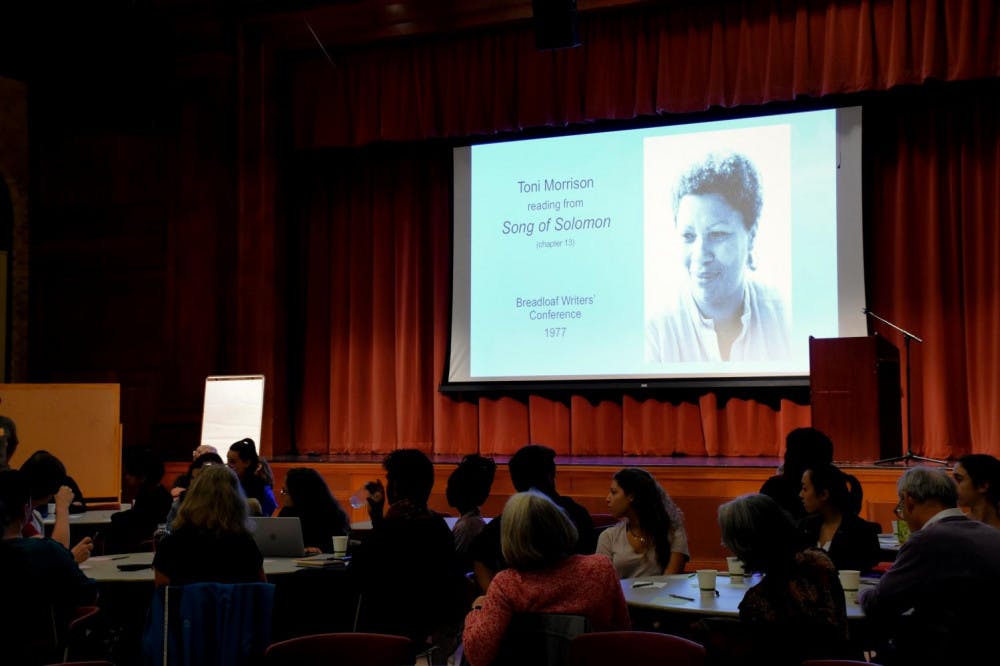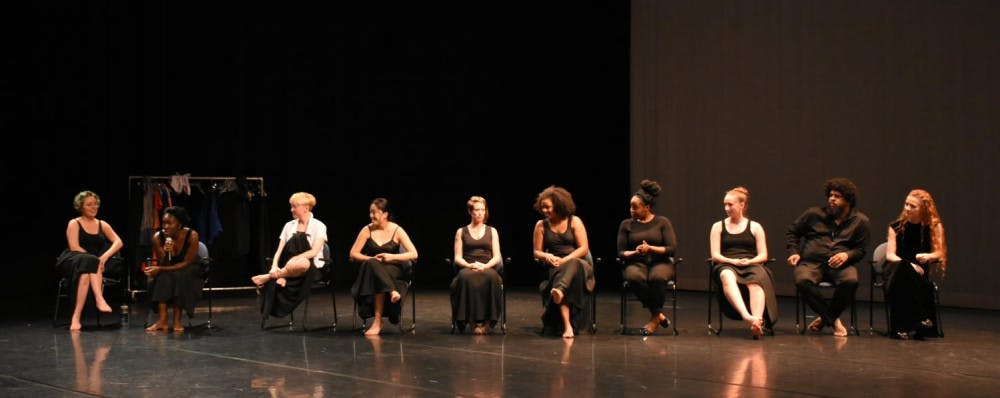Reading literature is the answer to our struggles with race and difference — or at least it’s the best place to start, according to participants in this year’s Clifford Symposium.
The 15th annual academic forum, which took place from Sept. 20-22, centered on the works of Toni Morrison, the Nobel Prize-winning writer and activist for racial equality. Her most recent book is “The Origin of Others,” this year’s required reading for all first-years and the title of the symposium.
The symposium was interactive, enabling audience members to not only react to Morrison’s work, but also engage on a personal level with the text and fellow attendees. While the vast majority of the comments and ideas shared venerated these texts for their remarkable ability to evoke empathy and inspire honest dialogue, the discussions also revealed questions left unanswered.
On the first night of the symposium, American Studies Professor J Finley delivered a talk entitled,“‘Yonder they do not love your flesh’: Ghosts, Strangers, and the Specter of Race” which discussed how Toni Morrison’s “The Origin of Others” prompts a conversation on the nature and shape of American racism, and how violence and brutality have become its daily doings.
Finley addressed how the stories of Margaret Garner, an escaped slave who murdered her daughter rather than see her enslaved, and Eric Garner, who was viciously murdered by the NYPD in 2014 while selling loose cigarettes outside a beauty supply store, help us reach understandings about guilt, explicit or otherwise, in the perpetration of racial violence. This discussion opened the symposium with a frank conversation about race. Finley’s talk explored how estranging another has become easier than knowing a stranger for instance, citing a sort of interdependence between blackness and whiteness. This interdependence has become an obstacle, she said.
To this point, Treasure Brooks ’21 asked how to encourage widespread participation in the movement for racial equity.
“I think often whiteness is deracialized to make it seem as if to be white is to be void of race,” she said. “So I was wondering how do white people, or people who believe that they are white, have stake in the movement for racial equity?”
“It depends on what kind of world people want to see and live in,” Finley replied. “For white people, or people who identify as white, on a very basic and material level, what is the thing one is willing to give up? If you are actually willing to participate in a movement for racial justice because justice requires that the scale is not a metaphysical thing. One way is to become educated about the meaning of race and how it has come to be any particular context.”
The following day, the symposium shifted to a discussion of artistic interpretations of Morrison’s work. A performance that presented an adaptation of one of Morrison’s short stories, “Recitatif,” artfully experimented with racial erasure, toying with the audience’s perception of the character’s races in order to recount the story without explicitly racializing the characters. It was a collaborative effort that revealed how music, dance and theater can intersect and enhance meaning in Morrison’s work.
Matthew Taylor, a new faculty member in the Music department, and the pianist Asiya Korepanova captured the emotions, intensity and complicated presentation of characters in Morrison’s work through music. A choreographer and performer, Professor of Dance Christal Brown used the art form as a way to emphasize the story’s central themes. Though at times confusing, the dance performance’s ambiguities were deliberate. It sought to deconstruct understandings so that new insight might replace them. According to Michole Biancosino, who adapted Morrison’s work into this form, this intention guided much of the piece’s staging.
Although many of the events fostered constructive dialogue, some felt a need for continued conversation. One individual, who chose not to identify himself, spent much of the student forum objecting to the ideas presented by students and faculty, claiming, “the history of America is in the direction of progress.” This comment came after nearly an hour and a half of readings, all of which conveyed the deeply sad truth of racially motivated violence in the history of the United States, and the shared experiences of students of color on being othered.

Symposium attendees sat in small, circle groups and discussed the work of Toni Morrison.
While the symposium showed the college’s desire to spark dialogue around race, there were no direct mentions of other college initiatives related to the issue, except a book club organized in the spring by students in a course taught by Will Nash, a professor in the American Studies and English and American Literatures departments, and one of the symposium organizers.
In remarks delivered on the symposium’s opening night, President Laurie Patton stressed that Middlebury has only begun to scratch the surface of these issues. No direct references to any recent on campus incidents were made. Regardless, Patton’s sentiments expressed a desire to not only maintain discussions of race and difference but also to deepen those discussions.
“I believe that we at Middlebury have only begun to scratch the surface of the ongoing and deeply historical conversations we need to have about race in this symposium and about all forms of difference — class, gender, gender identity, sexuality, religion, just to name a few,” she said.
Patton said the community must think about how individuals have othered people in the past and continue to do so today at Middlebury. In order to make inclusivity part of the college’s everyday ethic, she argued, the community must understand the ways that Middlebury itself has been based on othering, built with some but not all people in mind.
Similarly, Nash commented on the timeliness of the symposium during his talk entitled, “Why Read Toni Morrison Today.” This discussion comes at a time when the community is wrestling with what it is going to be, he explained. In an interview with The Campus before the symposium took place, Nash emphasized that the symposium is not the end of the conversation, but part of a longer pursuit.
“We’re envisioning this as the beginning of a yearlong conversation, not a stand-alone weekend event,” he said. “We’re looking forward to how we can continue the work that we start with the Clifford throughout the course of the year.”
Student Government Association President Nia Robinson ’19, Shatavia Knight ’20 and Oratory Now Director Dana Yeaton organized the symposium’s student forum which sought to do just that.
The session began with audio of Toni Morrison reading excerpts from “The Song of Solomon,” recorded live at the Bread Loaf Writers’ Conference in 1977, just before it was published to great acclaim. Middlebury students read and responded to excerpts from “The Origin of Others” and Morrison’s other works including “The Bluest Eye” and “Song of Solomon.” They then opened the floor for wider conversation.
“We have been struggling with the idea of the other for a while and we will continue to struggle with this idea long after the Clifford Symposium” Robinson said.
In the meantime, students, faculty and staff are beginning a conversation. Nash offered a class this fall on the work of Toni Morrison, which filled-up quickly, indicating student interest in the topic. And yet, at the student forum, many tables remained unfilled. Empty chairs, timid audiences, unanswered questions and ambiguous declarations about progress and the lack thereof characterized this symposium and the college, an institution struggling to identify itself but eager to include the community in a collective effort to imagine a better Middlebury.
Timely Symposium Explores “The Origin of Others”

SILVIA CANTU BAUTISTA/THE MIDDLEBURY CAMPUS
A group of students and faculty performed an adaptation of Toni Morrison's "Recitatif" at the Clifford Symposium on Sept. 21.
A group of students and faculty performed an adaptation of Toni Morrison's "Recitatif" at the Clifford Symposium on Sept. 21.
SILVIA CANTU BAUTISTA/THE MIDDLEBURY CAMPUS
Comments



